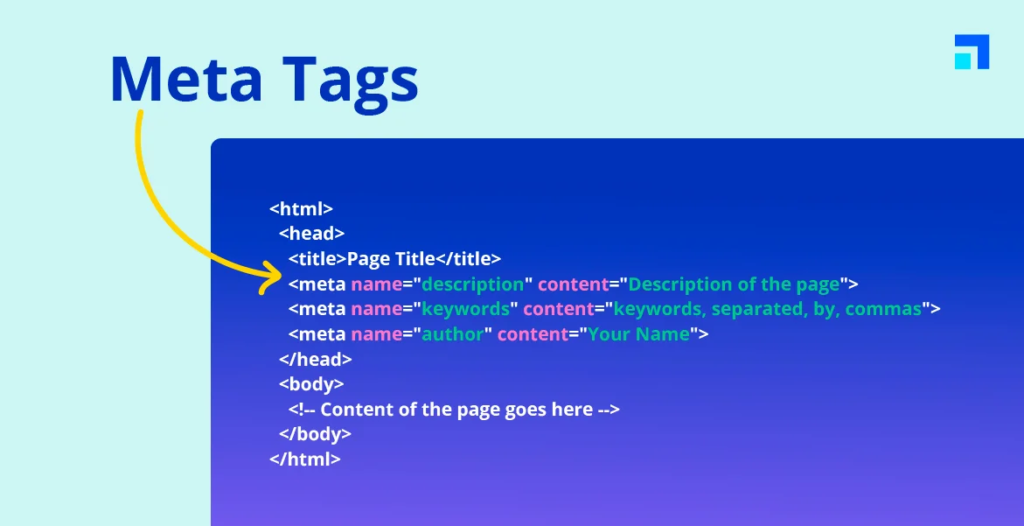Some components of web page optimization have come and gone in the dynamic field of search engine optimization (SEO). The meta keyword element has experienced an especially intriguing path among these. Over time, search engine algorithms have changed, making the meta keyword tag less significant than it once was as part of an SEO strategy. However, website owners and digital marketers can still benefit from knowing its background, applicability today, and best practices.
What is the Meta Keyword Tag?
The meta keyword tag is an HTML element that allows webmasters to provide a list of keywords that they believe are relevant to the content of their web page. This tag is placed within the <head> section of an HTML document and is intended to offer search engines additional context about the topics covered on the page.

Syntax of the Meta Keyword Tag
The syntax for the meta keyword tag is straightforward:
htmlCopy code<meta name="keywords" content="keyword1, keyword2, keyword3">
name="keywords": Specifies that the tag is providing keywords.content: Contains a comma-separated list of keywords relevant to the page.
History and Evolution of the Meta Keyword Tag
Early Days of SEO
In the early days of SEO, the meta keyword tag was a crucial element for search engines. Websites used this tag to list keywords they wanted to rank for, and search engines used it as a significant factor in determining page relevance and ranking. During this period, it was common practice to stuff this tag with as many keywords as possible, often leading to overuse and manipulation.
Decline in Importance
As search engines evolved, they began to prioritize more sophisticated algorithms and user experience factors. Google, in particular, led the charge by moving away from relying on meta keyword tags. This shift occurred for several reasons:
- Keyword Stuffing: Websites started abusing the meta keyword tag by including excessive and irrelevant keywords, leading to spammy practices.
- Algorithm Improvements: Search engines developed more advanced algorithms that focused on analyzing page content, backlinks, and user engagement rather than just keyword tags.
- Spam Control: Search engines needed to combat spam and improve search results’ quality, leading to a de-emphasis on meta keywords.
By the early 2010s, major search engines like Google had publicly announced that they no longer used the meta keyword tag for ranking purposes. Consequently, its importance in SEO diminished significantly.
Current Relevance and Usefulness of the Meta Keyword Tag
1. Historical and Analytical Value
While the meta keyword tag is not used by major search engines for ranking, it still holds value in historical and analytical contexts. Understanding how it was used and how SEO practices have evolved can provide insights into past trends and inform future strategies.
2. Internal Search Engines and Custom Solutions
Some internal search engines, content management systems (CMS), and niche search engines may still consider meta keywords. If you’re working with a proprietary search solution or an internal search function within a large site, using meta keywords might help improve internal search accuracy.
3. User Experience and Relevance
In some cases, meta keywords can be used to improve user experience on your site. For example, if you’re managing a content-heavy site with a vast array of topics, using meta keywords might help you categorize and tag content internally, even if search engines don’t use them.
4. SEO Strategy Integration
While meta keywords themselves are not a significant factor in modern SEO, they can still play a role in an overall SEO strategy. For example:
- Content Planning: Including relevant keywords in the meta keyword tag might help guide content planning and strategy, ensuring that your content aligns with target keywords.
- Competitor Analysis: Reviewing meta keywords of competitors’ websites can provide insights into their SEO strategies and help identify gaps or opportunities.

Best Practices for Modern SEO
Given that the meta keyword tag is no longer a primary SEO factor, focusing on modern best practices is crucial for effective SEO. Here are some strategies to enhance your SEO efforts:
1. Quality Content Creation
Creating high-quality, valuable content is the cornerstone of SEO. Ensure that your content is relevant, informative, and engaging for your target audience. Focus on providing answers to users’ queries and addressing their needs.
2. Keyword Research and Optimization
Conduct thorough keyword research to identify relevant terms and phrases for your content. Use tools like Google Keyword Planner, SEMrush, and Ahrefs to discover high-volume and long-tail keywords. Integrate these keywords naturally into your content, headings, and meta descriptions.
3. On-Page SEO
Optimize on-page elements, including title tags, meta descriptions, and header tags, to improve your content’s relevance and search visibility. Ensure that each page has a unique and descriptive title and meta description that accurately reflects the content.
4. Backlink Building
Develop a strong backlink profile by acquiring high-quality, relevant links from authoritative sources. Backlinks are a key factor in search engine ranking algorithms and can significantly impact your site’s authority and visibility.
5. User Experience and Engagement
Enhance user experience by optimizing site speed, improving navigation, and ensuring mobile-friendliness. High user engagement metrics, such as low bounce rates and long session durations, can positively influence your search rankings.
6. Technical SEO
Address technical aspects of SEO, including site structure, URL optimization, and XML sitemaps. Regularly audit your site for crawl errors, broken links, and other technical issues that might affect your search engine performance.
7. Social Media Integration
Leverage social media platforms to promote your content and engage with your audience. Social signals can indirectly impact SEO by driving traffic and increasing brand visibility.

Conclusion
While the meta keyword tag has lost its significance as a direct ranking factor in modern SEO, it still holds value in understanding historical SEO practices and can be useful for certain niche applications. However, the focus for contemporary SEO should be on creating high-quality content, optimizing on-page elements, and employing comprehensive SEO strategies.
By prioritizing quality content creation, thorough keyword research, and best practices in on-page and technical SEO, you can effectively enhance your site’s search engine visibility and user experience. The evolution of SEO practices underscores the importance of adapting to changes in search engine algorithms and staying informed about industry trends.
In summary, while the meta keyword tag is no longer a major player in SEO, its historical relevance and potential niche uses mean that it’s worth understanding. However, for modern SEO success, concentrating on proven strategies and best practices will yield the best results in improving your website’s search engine performance and achieving your digital marketing goals. GMI


